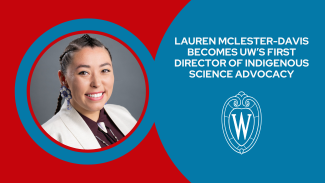
Lauren W. Yowelunh McLester-Davis, PhD, a University of Wisconsin–Madison neuroscientist and researcher, has joined the Native American Center for Health Professions (NACHP) in the UW School of Medicine and Public Health as its first director of Indigenous science advocacy.
In this new position, McLester-Davis will weave together science addressing Alzheimer’s disease and dementias, metabolism, and cognitive aging among Indigenous populations in Wisconsin and other groups often underrepresented in research.
A key aspect of McLester-Davis’s work at NACHP will include leading efforts to ensure tribal data sovereignty is at the forefront of the school’s research partnerships, which will be focused on considering each community’s specific needs, and establishing and building partnerships with interested tribal communities, including Tribal Institutional Review Boards (IRBs).
McLester-Davis’s work at NACHP will complement her own research as a member of the laboratories of Carey Gleason, professor of medicine at SMPH, and Judith Simcox, professor of biochemistry in the College of Agricultural and Life Sciences.
“Dr. McLester-Davis’s work will provide critical data to help us understand Alzheimer’s disease and related dementias in racialized groups,” notes Gleason, leader of the Inclusion of Under-Represented Groups Core of the Wisconsin Alzheimer’s Disease Research Center. “We cannot achieve health equity without inclusive science.”
McLester-Davis’s research focuses on biological markers and risks for Alzheimer’s disease and related dementias (ADRD) in minoritized populations, work she began while earning her PhD in neuroscience.
“Black and Native populations are at increased risk for developing Alzheimer’s disease compared to white populations,” McLester-Davis explains. “Inclusion of underrepresented groups in ADRD research is important for future treatment and prevention.”
Read the complete press release by Renata Solan here.
Updated December 11, 2023.



